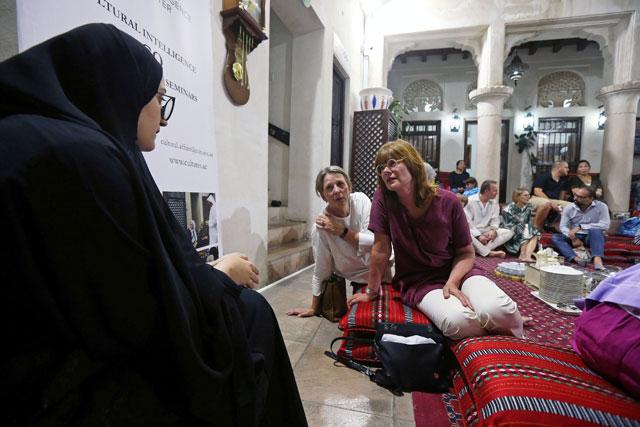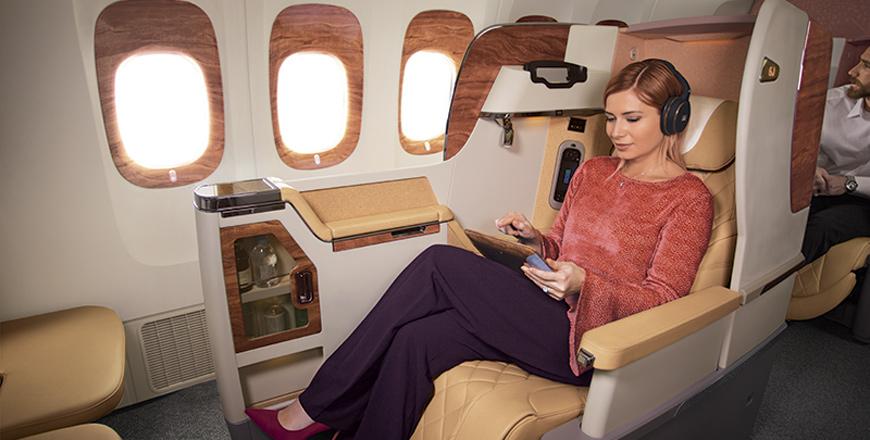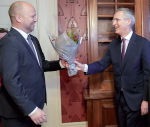You are here
How to be Emirati in a sea of foreign influence
By AFP - Oct 09,2014 - Last updated at Oct 09,2014
DUBAI — Think of the United Arab Emirates in the Gulf and what springs to mind? Billowing white robes against desert dunes, camel racing and falconry or futuristic buildings needling skywards?
Probably all of the above, and therein lies the crux for UAE citizens, who comprise just one in 10 of their own country's population.
Emiratis are trying to preserve their tribal customs, including the Bedouin lifestyle, against a tsunami of alien influences from a foreign labour force that has transformed their lives.
As a small minority in a sea of foreigners — 11 per cent of a population of 8.5 million — they wear traditional clothing and observe local customs as a statement of their identity.
Men don the white ankle-length kandura, and women loose black abaya cloaks, setting themselves apart from non-nationals lured by the beacon of economic prosperity.
"We'd be wiped out if we were unprepared for cultural confrontation with certain people," said Abdulaziz Al Musallam, director of heritage at the Department of Culture and Heritage in Sharjah, one of the seven emirates.
"This massive presence of non-Emiratis pushes us to stick to our identity."
Despite joining the US-led coalition battling jihadists in Syria and Iraq — and with a woman F-16 fighter pilot reportedly leading the country's contingent — the UAE remains a conservative Muslim nation.
But much of the federation is relatively open socially, with foreign women in western dress mingling with Emirati women in head-to-toe abayas in the malls of the glitzy city state Dubai.
Torn between the temptation to open up and the risk to their identity, Emiratis are actively seeking to conserve a culture they hope to pass on to coming generations.
Social anchor
For an Emirati, tribal affiliation is a social anchor, along with customs like camel racing in which the best animals can cost millions of dollars.
"Our society is tribal in nature," said the writer and intellectual Said Hamdan. "There are desert tribes, coastal tribes and mountain tribes.”
"Tribes themselves matter, as does belonging to a tribe and the heritage of each tribe."
The UAE was formed in 1971 as a federation of six emirates — Abu Dhabi, Ajman, Dubai, Fujairah, Sharjah and Umm Al Quwain. The seventh, Ras Al Khaimah, joined a year later.
Its oil wealth and flourishing economy has long attracted foreign workers.
Musallam believes a solid cultural front — rooted in tribal customs — is essential in countering the influences of large foreign communities, an apparent reference to Asians and Westerners.
"Dress, lifestyle at home and popular arts linked to camels and falconry are essential pillars of the national identity that we want to safeguard," he said.
Emiratis lead quite separate lives from the expatriate population, who have their own schools and enjoy freedom of worship — but cannot obtain citizenship even after decades in residence.
And as for marriage, Emirati men are expected to marry one of their own — although some have taken foreigners as second wives, stirring lively local debate.
Obvious signs of wealth
Despite rapid modernisation, as transformed city landscapes bristling with skyscrapers attest, elderly Emiratis prefer the old way of life, receiving and entertaining guests in their majlis or meeting room.
In the majlis of their own homes, men are served cardamom-flavoured Arabic coffee and dates as they discuss the issues of the day, while the country's rulers also open their majlis to citizens seeking favours or wanting to register complaints.
When Emiratis do venture out, they are instantly distinguishable by their wafting perfumes, traditional clothing and obvious signs of wealth.
Protocol expert Ghassan Hajjaj said UAE nationals are known for their love of heady fragrances based on oud, amber, musk and rose, products that were historically part of the region's caravan trade.
Major manufacturers produce special perfumes for the Gulf Arab states, and traditional kanduras and headgear can carry top western designer labels.
In addition to promoting identity through outward appearance, the government wants to ensure young Emiratis qualify to join the labour force, to reduce the dependence on foreigners.
The Emiratis' challenge, Musallem said, is to preserve their identity in a society transforming under the twin effect of immigration and new technologies — illustrated by plans to send an unmanned probe to Mars by 2021.
"Should we change to adapt to modernity when building a state, or preserve our culture?" he asked. "For the past 40 years, we have remained the same."
Related Articles
DUBAI, United Arab Emirates — The American ambassador to the United Arab Emirates expressed regret on Monday over the handcuffing of an Emir
DUBAI — No question was off limits for curious tourists and foreign residents of Dubai wanting to learn more about Emirati culture and the M
Summer just got better with Emirates Skywards offering all its members the chance to upgrade their membership to the coveted Gold tier.For a
















